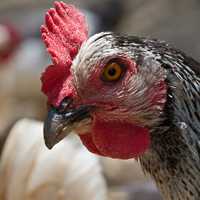Bringing a Bird into the United States

USDA restricts birds from countries where avian influenza H5N1 is present in poultry.
Although CDC has rescinded its restriction on the importation of birds and bird products, CDC supports USDA/APHIS in its ongoing regulations to prohibit or restrict the importation of birds, poultry, and unprocessed birds and poultry products (such as eggs and feathers) from countries where highly pathogenic avian influenza (HPAI H5N1) has been confirmed in poultry. For more information about CDC’s role, please see CDC Has Rescinded Embargo of Birds from Specified Countries.
USDA’s Animal and Plant Health Inspection Service (APHIS) implements regulations regarding the importation of birds. To import a pet bird of non-U.S. origin, meaning a bird imported for personal pleasure of the individual owner and not for resale, the owner must fulfill the following requirements:
- Obtain a USDA Import Permit [PDF – 74 KB, 1 page]
- Provide a current health certificate issued by a full-time salaried veterinarian employed for the agency responsible for animal health of the national government in the exporting country of origin.
- Quarantine the bird for 30 days, at the owner’s expense, in a USDA animal import center (listed on the APHIS website).
APHIS also provides procedures for returning pet birds of U.S. origin to the United States, and for a variety of other live bird importation situations.
In the United States, the U.S. Fish and Wildlife Service (FWS) regulates the importation of birds protected by the Convention on International Trade in Endangered Species (CITES) and the Wild Bird Conservation Act of 1992 (WBCA). These regulations are part of an international conservation effort to protect exotic wild birds subject to trade. Most exotic pet birds, including parrots, parakeets, macaws, lories, and cockatoos, are affected by CITES and the WBCA. However, the budgerigar, cockatiel, and rose-ringed parakeet are exempt. According to the WBCA, to import a pet bird of non-U.S. origin into the United States, you must have continuously resided outside the United States for at least one year. In addition, the WBCA limits the number of pet birds that can be imported to two birds per person, per year. All required WBCA and CITES permits must accompany the bird while in transit. Visit the FWS Wild Bird Conservation Act website to obtain more information and the permit application.
Related Links
- Page last reviewed: September 1, 2016
- Page last updated: September 1, 2016
- Content source:


 ShareCompartir
ShareCompartir